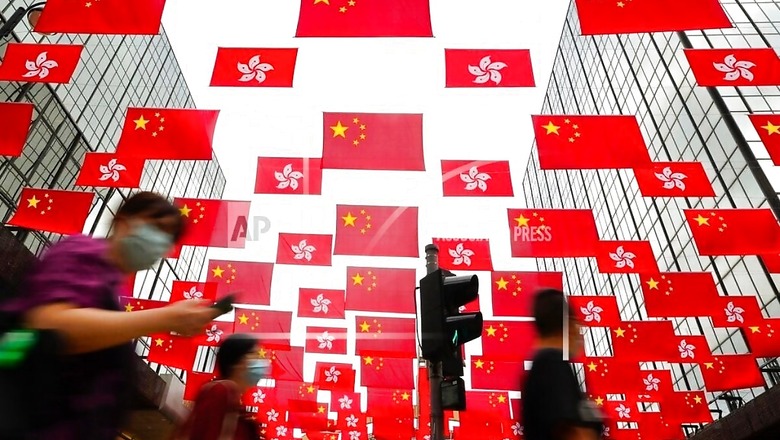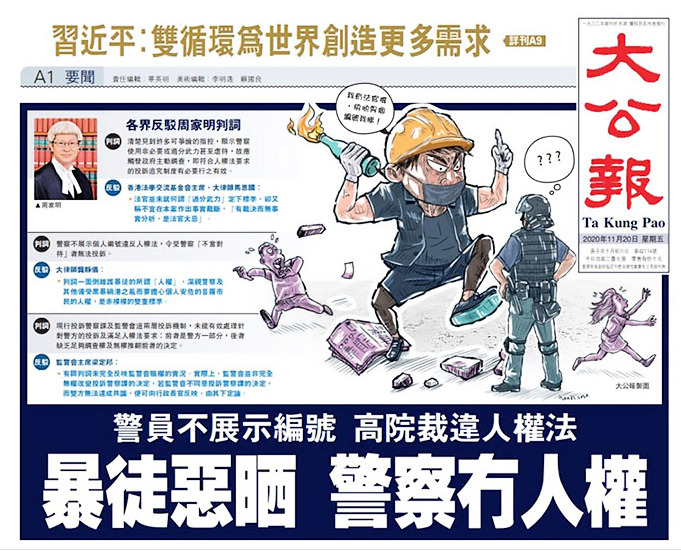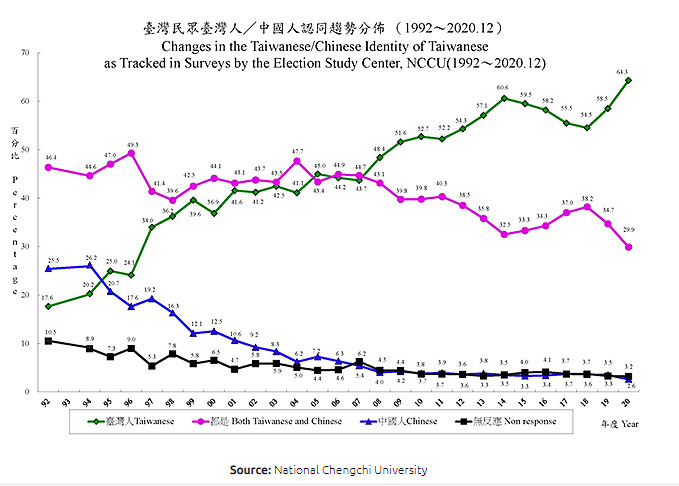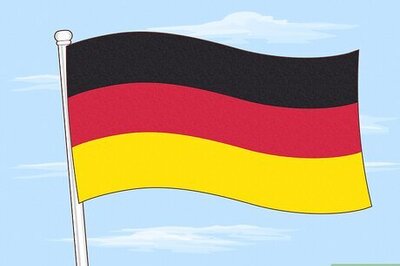As China Tightens Grip over Hong Kong, Verdicts of Island’s Judiciary Must Reflect National Interest

views
June 30, 2021, marks the first anniversary of Beijing’s imposition of the national security legislation on Hong Kong. The fact that the Chinese Communist Party (CCP) chose to steamroll this law, which criminalises anything that the authorities term as secession, subversion, collusion with foreign forces, and terrorism, on the eve of the anniversary of Hong Kong’s handover from the UK to China, signalled its intent to thumb its nose at agreements.
The CCP maintained that the pro-democracy demonstrations in 2019, which had turned violent at some places, had forced its hand to promulgate the law, which in its view would restore stability. In Beijing’s assessment, the demonstrators were only testing Zhongnanhai’s resolve, and China’s President Xi Jinping had termed the protesters as separatists, warning that they would be “smashed to pieces”.
The legislation has completely altered Hong Kong’s legal landscape. The judiciary is where some of the most severe reverberations are being felt after the political system. Now, significantly the Office for Safeguarding National Security of the Central People’s Government (CPGNSO)—which was established under the aegis of the national security law—has mooted that since the National People’s Congress (China’s Parliament) authorises the island’s independent judiciary’s power, its verdicts must reflect the national will and national interest. The CPGNSO reports to the State Council—headed by Premier Li Keqiang—and is not subject to Hong Kong jurisdiction. CPGNSO’s head Zheng Yanxiong, who was appointed by the mainland in July 2020, had underscored national security was one of the main requirements for the city’s stability and the long-term development of the “one country, two systems” framework under which it is governed.
“Once national security topples, ideas of independence, mutual destruction, and self-determination will reign over the city. How can we then secure ‘two systems’ when ‘one country’ is gone?” Zheng posed rhetorically. The CPGNSO is tasked with overseeing and supporting the local authorities in safeguarding national security, collecting intelligence that has a bearing on national security and handling cases related to offences that jeopardise national security, amongst other functions. This is almost tantamount to the Central Intelligence Agency telling the US Supreme Court justices that their decisions have to reflect the national resolve.
ALSO READ | July 1 Democracy March: Hong Kong, as the World Knew It, is Finally Dead Now
In September 2020, the phrase “separation of powers” (between the executive, legislature, and judiciary) was dropped from teaching material of Liberal Studies textbooks. Introduced in 2009, Liberal Studies is one of the four core subjects included in the city’s university entrance examination. It aims to cultivate students’ critical thinking skills and improve their awareness on social issues. The Hong Kong Professional Teachers’ Union condemned this as “political censorship”, but Hong Kong Chief Executive Carrie Lam supported the exercise, stating that the central government on the mainland bestowed administrative, legislative, and judicial authority to the island, and that these three institutions were ultimately accountable to Beijing. At the 2019 Plenum, a conclave of top CCP officials resolved to upgrade China’s governance system and capacity, which included improving the legal system and enforcement apparatus for the maintenance of national security in Hong Kong and Macao.
These developments beg the question: Is this a pointer to a significant realignment in the relationship between the Party-state and Hong Kong, especially its judicial branch, in the near future?
There have been insinuations against judges, especially in media outlets that favour the CCP. A newspaper published a report with the title ‘Hooligans rule, police have no human rights’ while reporting on a trial in which the High Court in Hong Kong had rapped police officers for not displaying their identification, terming it as a violation of human rights law. It also featured a caricature depicting a protester armed with a petrol bomb in one hand telling a police official: “The judge is supporting me, show me your identity papers.” Besides that, it printed a picture of the judge wearing a wig, drawing a parallel with the same practice in UK, which ruled over Hong Kong till 1997. The CCP has consistently blamed “colonialism” for the island’s ills. The Hong Kong Bar Association (HKBA) wrote to Justice Secretary Teresa Cheng, protesting against the coverage, terming the accompanying article bordering on the margins of a contempt of court.

Independent judicial institutions are also not being spared. HKBA chief Paul Harris has been targeted by Beijing for suggesting that there should be changes to the national security law. Days before Hong Kong’s Court of Final Appeal was scheduled to hear a bail application by media entrepreneur Jimmy Lai, Chief Justice Andrew Cheung had a one-on-one meeting with Chief Executive Carrie Lam (@jeromeacohen, February 1, 2021).
Between 1 July 2020 and 29 June 2021, police arrested or ordered the arrest of at least 118 people in relation to the national security legislation. At least three individuals were under 18 at the time of arrest. As of 29 June 2021, 64 people have been formally charged, and 47 people are presently in pre-trial detention in relation to these charges. The larger question remains with respect to their prospects of getting justice. If in the future jurists can be browbeaten to toe national interest (read CCP line), then lawyers early in their careers may also be disinclined to take on politically sensitive briefs. Judges too will have to tread a fine line between upholding legality and becoming an instrument of legitimation.
At the time when the national security law was promulgated, the CCP said only a “miniscule minority” that was bent on disturbing peace on the island would be in the crosshairs of law enforcement. With newspapers like Apple Daily closing down shortly after the police froze its bank accounts, raided its offices and arrested editors, the island has been transformed into a place where there are no civil liberties, no freedom of press, and arbitrary detentions. In its travel advisory, the US government has warned its citizens of “arbitrary enforcement of local laws”. As Hong Kong marked the CCP’s centenary on July 1 for the first time with the release of commemorative stamps with achievements in science and urbanisation that Xi Jinping wants to showcase, Hong Kongers will bear in mind a completely different legacy.
ALSO READ | Hong Kong’s Pro-Democracy Paper Apple Daily Bids Adieu After Police Freeze Assets
Any reconfiguration of relations between Hong Kong and the one-party Chinese state is also bound to have larger repercussions. Currently, foreign judges preside over the bench in Hong Kong, and this has long been seen as a hallmark of the rule of law after the UK’s former colony returned to Chinese control. Two foreign judges from Australia and the UK who used to preside over on the island’s top court have quit. Carrie Lam has maintained that foreign judges won’t be barred, and that the city-state’s judicial system remains “hard as a rock” amidst global anxieties about the national security law’s impact. However, jurists serving on the bench in Hong Kong don’t seem to share the sentiment. In March 2021, the president of Britain’s Supreme Court, Robert Reed, who is also on the Court of Final Appeal told a House of Lords committee he would not be prepared to serve if there was “any undermining of the independence of the Hong Kong judiciary”. This comes amidst a clamour in the United Kingdom Parliament to reconsider the practice of judges going to serve on the Hong Kong bench. This is because while nations like the UK campaign against human rights violations in the special administrative region, the incongruence of their judicial officers serving in Hong Kong seems like a bad advertisement, and garners public disapproval.

The original purpose of the ‘one country, two systems’ formula was to signal to Taiwan that it could preserve a different political and economic system from the mainland. Former British colonies like Hong Kong and Macau were meant to be places where this arrangement could be showcased to convince the Taiwanese to return to the fold. A survey by Taiwan’s National Chengchi University in 2020 has revealed that over 64 per cent of the island’s inhabitants regarded themselves as exclusively ‘Taiwanese’. Whereas barely 3 per cent of the population asserted that they were ‘Chinese’ in 2020; in the 1990s, the corresponding figure was around 26 per cent. The drop in the number of respondents asserting their ‘Chinese’ identity seems to correspond with democracy entrenching itself on the island with direct presidential elections taking place since the mid-1990s. After witnessing Hong Kongers’ suppression, will the Taiwanese wilfully put the genie back in the bottle to consider reunification?
In a speech on May 31, Xi spoke about the need to create a respectable image of China, but the rollback of civil liberties guaranteed under its ‘one country, two systems’ means distrust will mar CCP’s 100th anniversary.
This article was first published by ORF.
Read all the Latest News, Breaking News and Coronavirus News here.




















Comments
0 comment